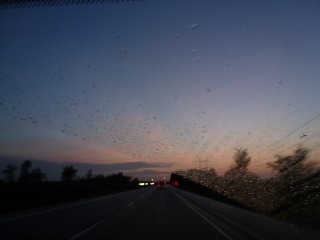Greer Gilman's Blog, page 85
October 12, 2011
Slightly
It was painted: like a pantomine in N. C. Wyeth's dreams, great rose-pink towering clouds, and a backdrop of islands. All gorgeously unreal, like pages in a moving picture-book. Maxfield Parrish on mushrooms. And the peg-legged parrot was animatronic! An actual toy. When was the last time you saw that?
The vertiginous flight to Neverland, through brilliant whirling planets, was sheer Diana Wynne Jones. (I'm thinking of that scene in The Merlin Conspiracy, leaping through the multiverse behind a goat.)
Jason Isaacs is a definitive Hook: seductive and psychopathic and horribly insecure. Such a elegant moire of courtesy and savagery. Glittering black. And blackly comic: in a panic, scrabbling for good thoughts, he mutters, "Ripping! Killing! Lawyers! Dentists! Kittens on spikes! White death, black death! Any death! A nice cup of tea!" He dies like a Etonian. (That croc is the stuff of nightmares.)
As is traditional, Isaacs is also a lovely meek bewildered Mr. Darling. At their last happy family evening, he sings "Stick close to your desk, and never go to sea..."
Meanwhile out to sea, his crew is hideous and sentimental, in the classic style. Richard Briers is a splendid Smee, ever anxious to oblige: "Whisky?" "I'm a little girl." "Rum?"
A few of the earlier scenes with Nana were excessively uproarious, as if from a Disneyer film. (There’s something about St. Bernards that unbalances directors.) I would have liked more contrast between London and Neverland.
However, their Aunt sits upright in the drawing room, reading War of the Worlds. Lovely joke.
(Yes, she’s uncanonical. I think Lynn Redgrave just wanted a part, and how could they refuse her?)
I missed John's having his iconic top hat when he flew off (I'm a traditionalist), and was inordinately pleased when he swooped down to snatch one in the London streets. Of course he loses it somewhere in Neverland; he comes back with a pirate's bicorne. That's summer camp for you.
I really liked that you could tell which Lost Boy was which, straight off. Excellent casting. I was especially fond of Slightly.
Michael’s teddy bear is a Lost Boy in its own right.
Loved the mermaids, beautiful and perilous, reaching with their blue-webbed taloned hands at air and earth, to pull them down.
I quite liked their Tink: a beauty who's not afraid to mug outrageously. She has the flitterwittedness, the rage, the mischief and possessiveness.
Their fairies are Richard Dadd. Rock.
![[info]](https://i.gr-assets.com/images/S/compressed.photo.goodreads.com/hostedimages/1380451598i/2033940.gif) sovay
: “I am sorry Angela Carter was not alive to review this film.”
sovay
: “I am sorry Angela Carter was not alive to review this film.”This was famously the sexy Peter Pan; but not outrageously. It’s all there in the book: growing up is a terror. But what this film worries at is not what lies beyond adolescence, not the office and the bills; but how you get there, the journey. “Oh, I am changing, changing, fearfully changing.” Casting Peter as a thirteen-year-old boy will do that. I do love a good principal boy, but in most productions there’s no threat. She is grown up already, pretending to refuse what’s past for her, on holiday from gender. A woman playing Peter is a glorious joke: that girl can be boyish; she will never be a man. (That of course could be her tragedy. I’ve never seen it done that way. I’d like to.)
This Peter is at once more innocent and perilous. As children and inhuman creatures don’t, he doesn’t get it. He rejoices, he crows; but he doesn’t wink. Or love. And he awakens things in Wendy he can’t deal with at all.
![[info]](https://i.gr-assets.com/images/S/compressed.photo.goodreads.com/hostedimages/1380451598i/2033940.gif) sovay
(who was there with a friend and her small daughter) wrote of Jeremy Sumpter, their Pan: "He has a faun's crooked, cocky smile that would be a satyr's in a year if he grew into it, but he never will.” And that tension and his bafflement seriously work. Peter in the end refuses, as he always does, to grow up. He remains a spirit and a boy; Wendy journeys on.
sovay
(who was there with a friend and her small daughter) wrote of Jeremy Sumpter, their Pan: "He has a faun's crooked, cocky smile that would be a satyr's in a year if he grew into it, but he never will.” And that tension and his bafflement seriously work. Peter in the end refuses, as he always does, to grow up. He remains a spirit and a boy; Wendy journeys on."All a bit tragic, really, innit?" says Smee.
But joy of joys, this Wendy (Rachel Hurd-Wood) is fierce. Not just physically, though she can sword fight like a pirate queen. (Her persona is Red Gill, and she rocks. Beats the soppy Wendy-house dolly, mending pretend socks.) This Wendy is neither a ragdoll nor an action figure, but a nascent heroine; she wants to go beyond Neverland, to explore the future, where it’s scary and strange and ecstatic. She’s curious. She’s brave. At their parting, echoing his own essential line, Peter says to her: “To live will be an awfully big adventure.”
And it will.
But as a child, she’s had her pirate ship, aglow with elf-light, sailing through drowned churches in a London fog.
Nine
October 7, 2011
The Step-Daughter of Time
What I’ve missed!
Just to get my ear attuned to her, I read an early one, A Shilling for Candles, and found it deliciously witty. Twenties theatrical gossip—divine!
Then I looked round for another romp.
I’d seen Miss Pym Disposes compared with Gaudy Night, so I read that next. Oh boy. Gaudy Night is a romance, a harmony arising from disturbance; Miss Pym Disposes is an excruciating tragedy arising out of idyll. I was shattered.
Miss Pym once taught French to fourth-formers; but inherited a little money and retired early. In retirement, she wrote a best-selling book on psychology, and is now something of a literary lion. As such, she’s been invited to the Leys Physical Training College to lecture the girls. (Josephine Tey both studied and taught at such a school, which turned out not only gym teachers and athletic coaches, but physiotherapists.) Being idle by nature, she’s inclined to turn the obligation down; but she owes the headmistress, Miss Hodge, a debt of gratitude: when they were at school, the older girl saved her from bullying (they’d found out that Lucy Pym was christened Laetitia).
So Miss Pym goes up there, expecting to go back at once (that bell at 5:30 am! that trampling!); but falls in love with the place, and stays on and on. She loves being with girls, loves their energy and instress. As well as round characters, wittily observed, they are for her Hesperides. Their garden is enchanted.
Tey almost never uses the girls' first names, or even "Miss So-and-So." Like soldiers, they're all known by their last names—Innes, Dakers—or by nicknames. The Nut Tart. Tuppence Ha’penny. The beautiful and lordly Nash is known as Beau.
The legendary school vacuum cleaner is called The Abhorrence.
And at first it’s played as comedy of manners, with an undertone of sexuality and the macabre: the irrepressible Dakers bursting in on Miss Pym in her bath; a small girl bundling George the skeleton (he at least has a name) in pieces down the hall, to hang him up before he’s missed.
But everyone at Leys is stressed out: their finals are coming, and they must be perfect both in theory and performance. Remember, they must qualify as therapists as well as gymnasts; they take a heavy load of science courses. And their anxiety, at first a shadow on the sunlit meadows, darkens intolerably.
Three of the many girls drive the story.
Rouse is ferociously ambitious, smugly toadying, freckled, a terrific athlete and terrible at book work. She works like a dog but doesn't get it.
A glorious post has come up at Arlinghurst (so that’s where Jo Walton got it!), the "girls' Eton." The headmistress has not yet spoken, but gossip has got out, and the school can talk of nothing else. Of course it will go to the brilliant Innes. Who else?
As a favor to the overworked staff, Miss Pym invigilates a physiology exam. She catches Rouse trying to cheat: nothing overt, but she's clutching a crumpled handkerchief in her left hand, and she doesn't have a cold. Her look of innocence is unmistakable. Pym doesn't want to upset the others by questioning her--this is where I started swearing at the book. Of course, she bloody well should have stopped the little toad after the exam and insisted on searching her. But no. By keeping a sharp eye, she makes sure that Rouse sweats bullets and consults nothing.
And then afterward, on the way to the village, Miss Pym finds a tiny little lost address book, the size of a postage stamp, crammed with useful notes on physiology. She tells herself that she's a visitor to the school, that she doesn't want to make trouble, that it could have been just someone's study notes, that it could have been anyone's, that after all, Rouse didn't actually use it--and she fucking well destroys it. Which destroys this world.
By now I'm hopping up and down and howling.
This is Thomas bloody Hardy, only worse.
Innes has let herself dream, and is going around in a transfigured glow.
So the results are posted. Innes is easily first in the class. To everyone's surprise, Rouse has done very well indeed, except on that last exam, in which she's barely scraped a pass.
And the headmistress gives Rouse the precious post. By now the entire faculty is hopping up and down and howling. But no, Miss Hodge is adamant. She doesn't like Innes's stand-offishness. She doesn't like her snobbery. She distrusts brilliance. Her sympathy is all with the plodders of this world, the plain girls, the triers. Miss Pym tries to explain about the cheating, but all she does is damage her friendship with Miss Hodge. The evidence is gone.
Innes is shattered.
Rouse has been practicing gymnastics alone at dawn. Everyone knows this. She's lost her nerve on the balance beam--stress--and her teacher has ordered an extra half-hour of work. On the morning of the Demonstration (their graduation performance), she doesn't come down to breakfast, and is found at last on the floor of the gymnasium with a fractured skull. The pin of the balance beam has inexplicably worked its way out.
Except the ubiquitous Miss Pym couldn't sleep and was there before her, and found a little silver shoe ornament lying on the floor. From a dance class? But the gym is vacuumed every night.
Rouse dies.
Innes gets reversion of the Arlinghurst job. She going around looking like something from Dante.
The inquest rules it Death by Misadventure.
At a dorm party, on the last night before the school breaks up, Miss Pym sees Innes wearing pumps. One of them is missing an ornament. That is what she's been trying not to think of. All night, she tosses and turns. She tells herself that she must go to the police with her evidence; but she can't bring herself to do it. She keeps thinking of Innes hanged. She thinks of her brilliance, of the work she could do; of her threadbare, cultured, loving parents; of Nash bereaved. Finally at dawn, she knocks on Innes's door and shows her the evidence. Innes is distraught and confesses. Pym tells her that she ought to turn her in, but she can't. Innes says she'll do anything to atone. If only Miss Pym won't turn her in, she'll sacrifice herself, give up every hope she's ever had. She's already given up the Arlinghurst job, and now she'll go back to her unloved stifling town and work in her father's clinic. Miss Pym doesn't ask her to, but she puts it in writing and she signs.
Everyone's gone except Nash. Nash and Innes had been going hiking in Norway together as a celebration, but that's off now. Their friendship is not what it was, Miss Pym thinks. In her omnicompetent way, Nash helps Miss Pym pack. This ought to be a comic scene (there have been many awkward parting presents from the girls), and superficially it is. Nash goes through all the cupboards to make sure nothing's left behind, and at the back of a drawer she finds the little silver rosette. Miss Pym can't bring herself to keep it; she can't very well throw it away. Oh, that's from my shoe, says Nash. I'd been wondering where it got to.
I couldn't sleep afterward.
My take is that Nash did it for Innes and Innes is going to the stake for her. And that the martyrdom is driving them apart. It was written in her iconography; for Tey, portraiture is truth, and if she’s painted Innes as a martyr, that’s her fate. If Innes herself had done it, she'd confess at once. If Nash did it, she did it to go back to yesterday, that bright dawn with their unblemished and expectant future. But Innes can’t go back; she can’t accept the tomorrow Nash has bought for her at such a price. Nash thinks she’s throwing it away.
I told this to sovay and she said, “So, basically, it's Heavenly Creatures with better education.”
Dear goddesses, it is. Without the hysteria. And just as harrowing.
Beyond that, there’s the tragedy of Miss Pym’s meddling. If she hadn’t decided to play detective—In Nine Tailors, the detective is unwittingly the murderer, an ourobourean plot. In this, Pym’s choices at the crucial switchpoints—not to intervening, to intervene—drive the tragedy. God disposes. And she’s playing him.
Thank you for reading this. I needed the catharsis.
And now I’m going to cheer myself up with To Love and Be Wise. I hear it’s astonishing.
Nine
September 30, 2011
Shapiro versus Godzilla
Tonight at the Director’s Guild Theater, a screening of the forthcoming
movie “Anonymous” was followed by a heated discussion between Roland
Emmerich, the director, and James Shapiro, a Shakespeare scholar.
Conspiracy, drama, and contention were in the air, and why not? All the
world’s a stage, after all.
James Shapiro on the film as a whole: “This was factually incorrect in almost every respect.” (applause)
James Shapiro on how things happen in Hollywood: “I’ve long been interested in why smart people saystupid things.”
James Shapiro on royalty: “I’ve never seen Queen Elizabeth depicted as
someone who couldn’t keep her legs together or her head on straight."
The Oxturbators will be frothing mad.
And just as an apéritf after that swill, Ralph Fiennes on Coriolanus.
September 26, 2011
Farthing Sun
September 21, 2011
Thrilling region of thick-ribbed suck
In Emmerich's fever dream, the Earl of Oxenford is Elizabeth's son. And her lover. And the father of her son, Southampton. And Essex's half-brother....
I'm not making this up, you know.
Holger Syme reports:
At age 8 [in 1558], the young Oxford wrote A Midsummer Night’s Dream
and played Puck in a performance for Elizabeth; the child wrote other
plays now falsely attributed to Shakespeare as well, but I can’t recall
which ones. Poor Oxford is then forced to live in the cold, austere,
brutally Puritan household of William Cecil, where he kills one of
Cecil’s servants who’s hiding behind an arras in his study (“a rat!”)
and is discouraged in his artistic endeavours....
Decades later, in 1598, he wants to use his old plays, and a bunch of
new ones, to arouse popular support for Essex and against the Cecils,
whom everyone apparently loathes; so he seeks out Ben Jonson, who’s just
been arrested for “Everyman,” and gives him one of his plays to stage
under Jonson’s own name — Henry V. When Jonson hesitates to
claim the play as his own, the illiterate drunkard, notorious fool, and
bit-player William Shakespeare (not, judging by his accent, from
Warwickshire at all) steps forward and takes full credit. Oxford
continues to hand over plays; Shakespeare starts extorting the Earl to
the tune of £400 a year and kills Christopher Marlowe outside the Rose
Theatre when the playwright discovers the secret of dumb Will’s success.
Eventually, in order to stir up popular discontent against Robert Cecil
(a dwarfish hunchback), Oxford writes the brand new and never-before
staged play of Richard III and has it performed on the eve of Essex’s uprising in 1601...
Nine
September 20, 2011
Kunstkammer

I love a cabinet of curiosities. I dream of transcending Chaos (which I live in) to a sphere of heaven thickly starred with objets d'art, with box in box of shells, Delft, ivory, amber, and intaglio: things to toy with, rooms to ravish all the senses, "sounds and sweet airs that give delight, and hurt not." Don't you love the nymph with her iPad?'
Of course, the Library is just along that silvery corridor.
And if all this beauty palls, just out there are the gardens, terraced to the river, and the hills beyond.
Nine
September 12, 2011
"... a braiding of tales..."
The final part's long enough to be a novel on its own, but builds on the earlier material to create an elegant, powerful structure, resolving not only its own matter but that of the first two parts, in surprising yet inevitable ways. And it does this by moving deeper into the world it creates, indeed by ascending through that world to — and beyond — the limits of the heavens it had begun by only suggesting; by telling a story, and then going deeper into the story.
That movement, toward increasing wonder, is an excellent spine for a fantasy tale. It's surprising, then, to reach the end and find out with the final dovetailing of twists that this is a story about the thinning of the world; about the slow ebb of magic, and its replacement by scientific thinking — by greater understanding, if less enchantment. Usually in fantasy that thinning is dreaded, even fought against. Here it feels almost delightful; it is natural, not a cause for mourning, but the coming of spring after winter.
This is why I write. It lifts my heart.
Nine
September 10, 2011
Ravelling a Hedge-Pig
Here (for your amusement) are some awful Spenserian verses and a rare page of Early Low Jacobean, which I may repurpose. Thrift, Horatio!
Sadly, Corrasable Bond is an absolutely terrible archival medium--what did I know?--but I hope this is mostly legible.



Nine
September 5, 2011
Entropy reversed
The Square aten't dead!
Makes me dance for joy. I hope they'll have my toile de Jouy folders and Strathmore drawing pads and all 128 shades of colored pencil and posh fountain pens and their wonderfully witty or beautiful unHallmark cards....
Nine
September 1, 2011
Silver, silver-gilt, brass
My iPad has saved my reason.
Internet. Jigsaw puzzles. Books.
Mind you, what’s available to read on it is mostly very new or rather old: bestsellers and bad scans of out-of-copyright. There are marvellous things out there--and for free—but you have to hunt. I can’t get Hope Mirrlees or S. J. Perelman or Gwen Raverat or the Tom Stoppard I want (Arcadia and The Invention of Love); I can’t get Sylvia Townsend Warner or Anne Parrish’s All Kneeling or Elizabeth Enright or Angela Carter or Alan Garner.
Snail-like, I want to carry my whole library with me.
What I need is a book juicer.
What I’ve ended up with is an iPad with three jealously exclusive systems on it, like Sanskrit, Japanese, and Finnish—iBooks, Google Books, and Kindle,
Of the three, I find that iBooks is the pleasantest to use; Google is gorgeous but infuriating; and Kindle is a last resort, like a 7-11 when you’ve run out of milk.
Acquisition:
Hands down, iBook. You actually own the files. They exist on your hard drive: you can copy them. And it’s not limited to its own proprietary texts. You can put any PDF or epub that you like on it: a paper you’re giving at a con, a friend’s manuscript you’re beta-reading, your own books that you’ve scanned.
Notoriously, Kindle books aren’t yours. You’re renting them. And yes, I know the system can be hacked, but what happens when the Machine Stops? Where do they live when you're not reading them? Where do they go?
Google, in their infinite superiority, assumes you have a signal. Always. You have air, don’t you? And you’ll need one: because all your books are in the Cloud. Of course, you can download them, but they’re incredibly slow. iBook and Kindle : Blink. Blink. eBook: Whiiiiirrrrrr.
And eBooks have an infuriating habit of undownloading themselves. You’ll be in the middle of a terrific book, and get on a train and find that your book’s snowed backward, up into the Cloud. And if you don’t have 3G, farewell book.
Shelving:
iBook all the way. Because you own the files, you can edit their tags: correct misspelled titles and authors, impose authority (Lord Dunsany? Edward John Moreton Drax Plunkett, 18th Baron of Dunsany? Your call). iBook will sort by author, title, or category. You can invent any categories you want: Restoration Comedy, Pulp, Tiptree Winners (good luck finding those!), Homework, Steampunk, Weird Old Novels, Ooh, Shiny!, Autumnal....You can also create and delete and change cross-collections: Unread, say, or Comfort Reading.
You can search.
I usually keep them in list view. The display of virtual books on virtual bookshelves is really too precious. Besides, most of mine have plain covers. (Almost 95% of my books are free.)
Kindle does either a list or postage stamps in space. You’re stuck with whatever they give you as the title and author: P. G. Wodhouse, Sir Pelham Grenville Wodehouse. And with their cranky alphabetizing: Thomas Browne is filed under Sir, Jane Austen promiscuously under J or A. There are no other tags. No search.
Incredibly annoying feature: you have to know that you have to turn off the Popular Highlights setting: “Discover what other readers are highlighting in the books you are reading.” Which means they’re collecting yours. Shudder.
Google Books has only the postage-stamps-in-space setting, sixteen to a screen.* They are ordered by whichever you’ve opened most recently, so good luck finding them. No search. (Would you belive it? Google and no search?) You have to flip through the screens; and if your finger touches a postage stamp, that book starts downloading—really slowly—and the order shuffles again. If you touch more than one—if you the iPad slips and you grab it—they all start downloading, and the whole system hangs forever
Aesthetics:
So why keep Google Books around at all? We’re coming to that.
Kindle text is like the Model T: it comes in any color you like, as long it’s black. All right, monochrome. You get black on white, white on black (ugh!), or sepia on sepia. It has that one rather dreary typeface. No illustrations. Every book looks like every other book, like futurelings in some H. G. Wells Utopia.
For the many many readers who just merge with the story and don’t notice the typography, it’s fine. For me, it’s a stone in my shoe.
iBook is much more attractive. You have a choice of six fonts: Baskerville, Cochin, Georgia, Palatino, Time New Roman, and Verdana. Black and white or sepia. (I find it soothing.) Some books have kept their illustrations, and even their color plates. The screen is designed to look bookish, with a suggestion of pages and a cover. In landscape, it even has a gutter. Some people find this twee; I’m all right with it, subliminally. The animation is a bit over the top: the book opens like a book, the pages turn like pages, sometimes rather stickily.
In both Kindle and iBooks, especially with free texts, the OCR is a problem. Diacritics and digraphs are mangled; rubbish characters intrude.
In Google Books you can toggle between Flowing Text—what OCR produces—and Scanned Pages. I love love love this. The Flowing Text is nice enough. It comes in all the iBook fonts, plus Helvetica, and you can adjust not only the point size but the leading. But the Scanned Pages are gorgeous! I have a 1682 Religio Medici in facsimile, with manuscript marginalia. It’s oakleaf brown. I've got Joan Aiken with the Gorey covers. I have Trilby with all of du Maurier’s illustrations, which are half the story. I have books from the teens and twenties, laid out as they out to be. And I have my own Cloud & Ashes in its own beloved Centaur.
On Kindle, I’ve ended up with a handful of books that I haven’t found elsewhere (The Shell Country Alphabet), and that’s it.
Most of the titles on my iPad right now are iBooks or my own PDFs. All around, they’re the nicest to read, the easiest to work with.
But the prettiest and rarest are eBooks from Google—first editions in the ether! They’re worth putting up with the maddening interface. Sadly, I keep finding delicious titles—ooh, Katharine Briggs!—that turn out to cost $388. (Who sets these prices? How dare they?) Only Google has The Return from Parnassus; only Google has The Runaway (though without the later illustrations by Gwen Raverat). And somewhere in the Cloud, I have Endless Things, and Lexicon Urthus, and The Brontes Went to Woolworths.
Bliss.
Nine
*Their new iRiver reader seems to have a listview. Great, but I'm not buying a new device.
Greer Gilman's Blog
- Greer Gilman's profile
- 42 followers









